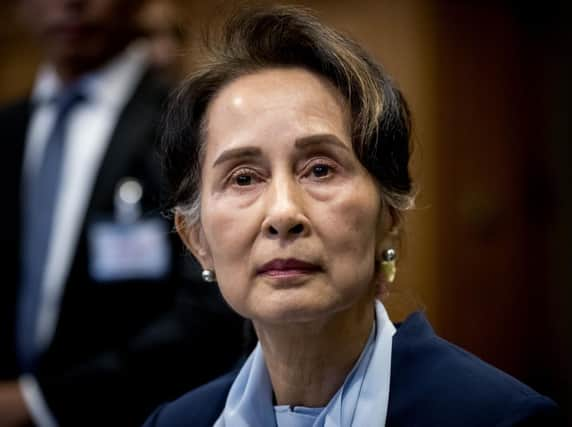Aung San Suu Kyi: who is the Myanmar leader - and what was her response to the alleged Rohingya genocide?


Aung San Suu Kyi, Myanmar’s state counsellor, has been charged by the country’s police following the military coup.
The civilian leader was detained and now faces several charges, including breaching import and export laws and possession of unlawful communication devices, and has been remanded in custody until 15 February.
Advertisement
Hide AdAdvertisement
Hide AdPresident Win Myint, believed to be in jail, has also been charged with violating rules banning gatherings during the coronavirus pandemic.
All power was handed to the top army commander, General Min Aung Hlaing, with a one-year state of emergency declared, according to a statement made on military TV on Monday 1 February.
Aung San Suu Kyi called for public protests against the military coup, which followed a landslide election win by Ms Suu Kyi’s National League for Democracy (NLD) last year.
Here’s everything you need to know about Aung San Suu Kyi, her response to the Rohingya crisis, and why she was detained by the army.
Who is Aung San Suu Kyi?
Aung San Suu Kyi’s official title in Myanmar is state counsellor, since the southeast Asian country’s constitution prevents her from becoming president as she has children who are foreign nationals.
However, Ms Suu Kyi is widely seen as the leader of the country, with President Win Myint being her close aide.
She is the daughter of Myanmar's independence hero, General Aung San, who was assassinated when Ms Suu Kyi was only two - just before the country won independence from British colonial rule in 1948.
After living in India with her mother Daw Khin Kyi, who worked as Myanmar’s ambassador in Delhi, she moved to the UK in 1964 to study at Oxford University.
Advertisement
Hide AdAdvertisement
Hide AdWhile reading philosophy, politics and economics, Ms Suu Kyi met her future husband, academic Michael Aris. Their two children were raised in the UK.
She travelled back to Yangon (formerly Rangoon), Myanmar’s largest city, in 1988 to look after her mother who was seriously ill.
But the country was undergoing major political upheaval, with protests demanding democratic reform.
Ms Suu Kyi went on to lead the revolt against the country’s then-dictator, General Ne Win, organising rallies calling for peaceful democratic reform and free elections.
These demonstrations were suppressed by the army, which seized power in a military coup on 18 September 1988.
The following year, Ms Suu Kyi was placed under house arrest.
Between 1989 and 2010, Ms Suu Kyi spent almost 15 years in detention.
She became an international symbol of peaceful resistance as she fought to bring democracy to the country, and in 1991 was awarded the Nobel Peace Prize, while she was still under house arrest.
Advertisement
Hide AdAdvertisement
Hide AdMs Suu Kyi finally led the NLD to a landslide victory in Myanmar’s first openly-contested election for 25 years in 2015.
The leader remains very popular with the country’s Buddhist majority, but internationally she has been condemned for her response to the Rohingya crisis.
What was Aung San Suu Kyi’s response to the Rohingya crisis?
The Rohingya, an ethnic Muslim minority group in Myanmar, which is predominantly a Buddhist country, have faced discrimination for decades and are subject to exclusionary citizenship laws.
The Myanmar government launched a military campaign in 2017, in response to Rohingya militants attacking police stations in Rakhine state, killing 12 people.
The country’s army has been accused of murdering Rohingya civilians and burning their villages, forcing hundreds of thousands of Rohingya to flee to Bangladesh and causing a refugee crisis.
Myanmar is currently facing a lawsuit accusing it of genocide at the International Court of Justice. Meanwhile, the International Criminal Court is investigating the country for crimes against humanity.
Aung San Suu Kyi’s leadership has become defined by the Rohingya crisis.
Advertisement
Hide AdAdvertisement
Hide AdShe has been accused of doing nothing to stop the violence against the Rohingya Muslims in the country by refusing to condemn the military’s actions, and she has repeatedly denied allegations of genocide.
The state counsellor defended the army at the ICJ hearing in 2019.
Ms Suu Kyi has since had her Freedom of Edinburgh award revoked, and other cities in Scotland, including Glasgow and Aberdeen, have stripped her of similar honours.
Why was Aung San Suu Kyi detained?
Military television in Myanmar said the army had declared a state of emergency on Sunday 31 January.
The statement said senior government leaders, including Ms Suu Kyi, had been detained in response to “fraud” during the country’s 2020 general election.
There has been increasing international concern that the military was preparing to retake power in Myanmar, after it said last week that a coup could not be ruled out.
Ms Suu Kyi’s National League for Democracy (NLD) won a landslide victory in November’s elections, gaining 396 out of 476 seats.
The military-backed Union Solidarity and Development Party won just 33 seats and has challenged the results.
Advertisement
Hide AdAdvertisement
Hide AdThe army has claimed there was widespread irregularities in the election and has alleged to have found 8.6million cases of fraud, which the election commission has denied.
International leaders have condemned the military’s actions.
US president Joe Biden’s press secretary, Jen Psaki, said the US opposed “any attempt to alter the outcome of recent elections or impede Myanmar’s democratic transition, and will take action against those responsible if these steps are not reversed.”
Prime Minister Boris Johnson tweeted: “I condemn the coup and unlawful imprisonment of civilians, including Aung San Suu Kyi, in Myanmar. The vote of the people must be respected and civilian leaders released.”
Neither Ms Suu Kyi or the president have been heard from since the military coup took place.
